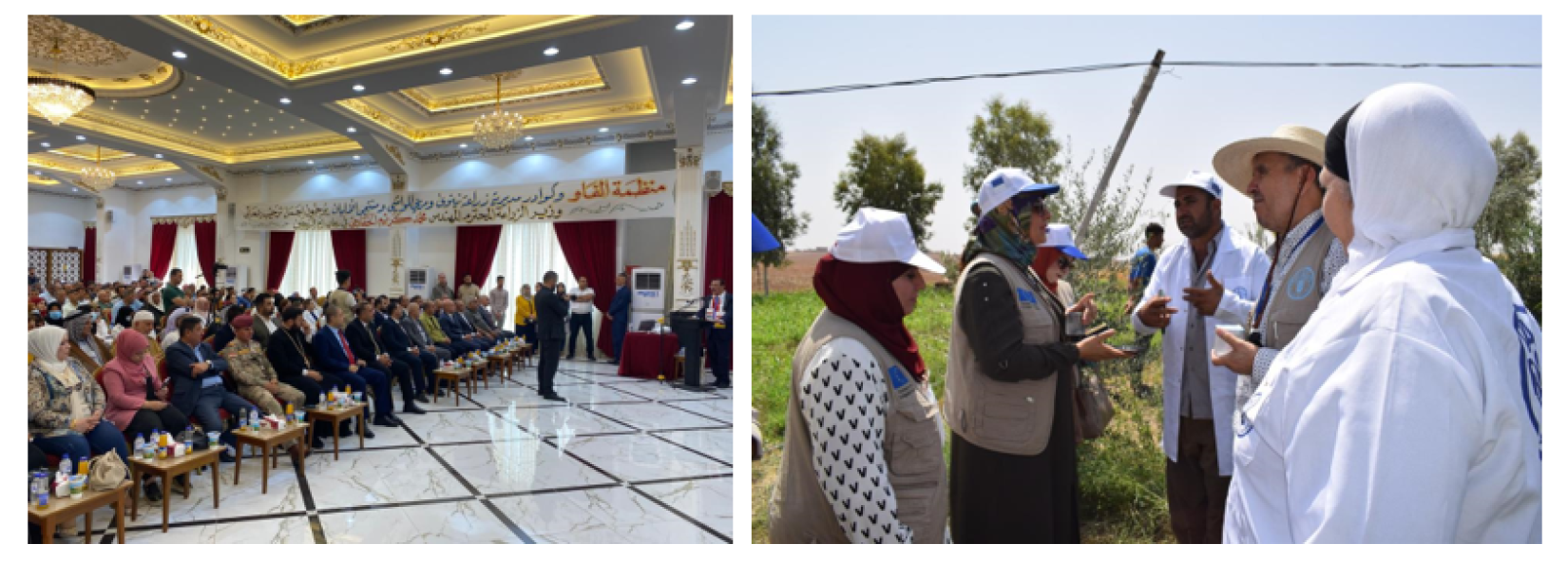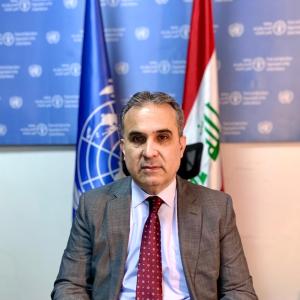H.E Minister of Agriculture together with High-Levels Officials from Department of Women Empowerment (General Secretariat of the Council of Ministers) and Ministry of Planning Praise and Appreciate Strategic interventions of FAO-EU Funded Project in Ninaw
27 August 2022
26 August 2022, Ninawa, Iraq
Over three days, officials from Department of Rural Women Empowerment (Ministry of Agriculture, General Secretariat of the Council of Ministers and Ministry of Planning visited interventions with women partners of Food and Agriculture Organization (FAO) through the project: “support to agricultural livelihoods of rural and peri-urban returnees and communities in Nineveh Governorate”, funded by the European Union and implemented in close cooperation with the Ministry of Agriculture.

These visits concluded with ceremony organized by FAO on Thursday, August 25- 2022 in Bashiqa in the presence of His Excellency the Minister of Agriculture, Eng. Muhammad Karim Al-Khafaji, FAO Representative in Iraq, Dr Salah El-hajj Hassan attended by the Director of Nineveh Agriculture, directors of all agricultural departments in Nineveh, local officials, and the head of the farmers Union h, as well as 300 farmers including 200 women from Ninawa project sites.
The Minister of Agriculture, Eng. Muhammad Karim Al-Khafaji, during his speech, praised the efforts of FAO through its project to support the livelihoods of returnees, especially with regard to women's groups where impacts are visible. As FAO is taking care of small dairy producers and provided them with equipment for the collection and processing of milk, as well as promoting of green fodder cultivation. Moreover, the FAO organization emphasized on introduction of modern technologies for farmers. H. E. the Minister added that the Ministry of Agriculture is strongly supporting this initiative to encourage increasing local production.
The Minister concluded that all these interventions and outputs introduced by FAO came to enhance the work of rural women by improving their work and increasing their income and stability in their areas after a long-suffering that exhausted them because of the terrorists.
FAO Iraq Representative Dr. Salah El-Hajj Hassan highlighted, “Thanks to the EU’s financial support and the real commitment and support from the H.E. Minister of Agriculture Mr. Muhammad Karim Al- Khafaji, we were able to implement this important project by scaling up the skills and capacities of women and advancing the agriculture sector, both its animal and plant components.” While reflecting the practical implementation in achieving t better: production, nutrition, environment and life.
“This project is an example of sustaining introduced expertise through the true partnership with the Ministry of Agriculture where practices were also shared with other extension staff from the Ministry in southern Governorates. The goal now is to redo this successful experience elsewhere to support the local farmers and rural women,” Dr. El-Hajj Hassan added.
Dr. Intithar Fahd from the Department of Women Empowerment in the General Secretariat of the Council of Ministers pointed out during her speech that our attendance today is in line with implementation of the outcomes of the meeting of the Higher Committee for the Empowerment of Rural Women, which was formed under the Diwani Order (93) for the year 2021, and directives His Excellency Prime Minister to visit the successful implemented activities in Nineveh FAO-EU Project, and the possibility of transferring the experience to the rest of the Governorates. She added during the past two days, we had a field tour to follow up on the success stories of the project, and we found that it went beyond the issue of livelihoods and went with other outputs, larger spaces, and aspirations beyond achieving some indicators of the sustainable development goals.
The Senior FAO Livestock Expert, Dr. Chedly Kayouli said that the project has given absolute priority to support women’s groups due to their contribution to the development of their livelihoods, he added that to date, over 10,000 women were trained on advanced livestock feeding techniques, milk production and marketing aimed at empowering rural women where 4,000 rural women have now better livelihood through enhanced skills in dairy products and technical expertise in feed production, milk collection. Likewise, these women were supported with hygienic stainless steel and food grade equipment including rehabilitation of village dairy centers for milk testing, processing and marketing to support their local businesses.
Finally, Minister of Agriculture and Officials valued and praised the interventions of the Food and Agriculture Organization (FAO), especially after listening to the impressive success stories of rural women in Nineveh. The delegation emphasized that the results of inputs and outputs of the project would be submitted to the General Secretariat of the Council of Ministers to adopt the transfer of this successful experience to other Governorates with support of FAO technical experiences.

He started his career in 1984, as Senior Research Assistant in the Agricultural Research and Education Centre (AREC), American University of Beirut. From 1987 to 1991, he was Coordinator of the Student Training Programme, and also Agriculture and Horticultural Teacher for the Faculty of Agriculture, at the Lebanese University.
From 1991 to 1995, he worked as Agricultural Engineer at the Ministry of Agriculture, Bekaa Regional Office, Zahlah and was then assigned to the Agricultural Research Institute in the Tal Amara station, first as Head of the Crop Production Department and subsequently in charge of the Plant Protection Laboratory. From 2002 to 2006, he was Director of the Kfardane Research Station (Agricultural Research Institute). In 2008, he became Visiting Scientist at the International Maize and Wheat Improvement Centre (CIMMYT) and Coordinator of a project with the International Centre for Atomic Energy Agency, Vienna.
In 2010, he served as Advisor to the Minister for Agriculture of Lebanon. In 2011, he became President of the Pesticide Scientific Committee, Head of the Phytoplasma Committee and Director of the Agriculture and Rural Development Programme (ARDP) (EU-funded project). From 2010 to 2013, he represented Lebanon in negotiations with EU, Egypt, Jordan and Iraq. During his career, Mr Hajj Hassan also carried out a number of other functions. He represented the Lebanese Agricultural Research Institute (LARI) in several research programmes with the International Centre for Agricultural Research in the Dry Areas (ICARDA) and the American University of Beirut. He was Coordinator of the Mashreq/Maghreb project with ICARDA, representing Lebanon in the Steering Committee, as well as being the Head of the Sugar-beet Delivery and of the Wheat Delivery Committees. For a number of years, Mr Hajj Hassan worked for the preparation of FAO TCP projects and served as the National Director of a TCP project. He joined FAO in January 2014 as FAO Representative in Yemen. Mr Hajj Hassan succeeds Mr El Zubi as FAO Representative in Iraq.


